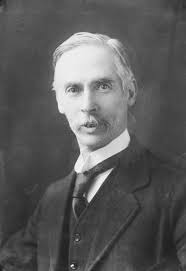Hobson, Atkinson John

Bio: (1858-1940) British economist and sociologist. John Hobson studied at Oxford. He is known for his analysis of the economic crises of the late nineteenth century which led him to create his „theory of underconsumption“. The main problem of the crisis was the excessive production of goods associated with a simultaneous reduction in demand. This leads to investment and production "bubbles" that grow very quickly before they burst. The problem arises when the savings invested in production increase, which contributes, at the same time, to an increase in supply, but also to a decrease in demand, because the money went to savings, not consumption. He believed that it was necessary to establish a balance between savings and consumption, and the basic way to achieve that was through social reforms and an increase in real wages.
Later, and especially in the famous study Imperialism (1902), he applied this economic theory to explain the Boer War in South Africa, as well as the whole system of imperialism. The Boer War came about because international mine owners and speculators who had investments in South Africa pushed Britain into the war to secure those investments. He believed that imperial wars were justified to the masses, in the countries of the center, by the fact that governments, through the daily press, indulged the worst instincts of the large urban masses and thus spread militarism. Imperialism is a consequence of the problem of declining demand, on the one hand, and the need for capitalists to increase profits, on the other.
The imperial wars provided an opportunity to acquire new markets for the placement of goods, and also to create markets for new investments. The imperial wars themselves were not profitable for the states that waged them, but only for the capitalists and financiers for two reasons: increasing profits and pacifying the working class. The impact of the wars on the pacification of the working class was twofold. By spreading nationalism and militarism, the capitalists diverted the attention of the working class from its catastrophic position, while, on the other hand, by gaining new markets, they solved the problem of reducing demand without making economic concessions to the working class. In the end, imperialism led to the First World War. Hobson believed that the introduction of a political system that would bring all the countries of the world together could prevent imperialism and new wars. Vladimir Lenin later applied a similar logic in his own study of imperialism, so this approach to imperialism was sometimes called "Hobson-Lenin's theory of imperialism".
Fields of research
Capitalism Capitalist Class Classes Colonialism Economy Ethnicity History Industry Market State Unemployment War Working ClassMain works
The Physiology of Industry: Being an Exposure of Certain Fallacies in Existing Theories of Economics (1989);
Problems of Poverty (1891);
Evolution of Modern Capitalism (1894);
Problems of Unemployed (1896);
The South African War: Causes and Effects (1900);
The Psychology of Jingoism (1901);
Imperialism: A Study (1902);
The Industrial System: An Inquiry into Earned and Unearned Income (1909);
Towards International Government (1915).

